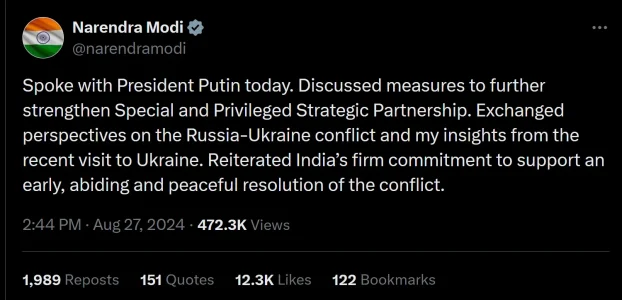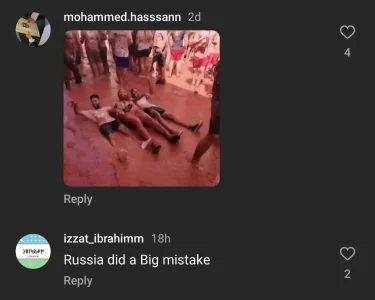Russia and India are close strategic partners who’ve jointly accelerated multipolar processes since the
global systemic transition began to unprecedentedly speed up in 2022. No serious disagreements exist between them, but they still don’t see eye-to-eye on everything, which is normal for any pair of partners. One issue on which they have divergent views is collective security in Eurasia, which former Director General of the Russian International Affairs Council Andrey Kortunov recently elaborated on.
In his article titled “
Collective Security in (Eur)Asia: Views from Moscow and from New Delhi”, he identifies several differences between them. The first is that Russia believes that the core security challenge on the supercontinent comes from overseas powers, previously the UK and now the US, while India believes that they’re integral to preventing “unipolarity in Asia”. They also therefore have naturally different approaches to the US and China, with Russia seeking to balance the former and India the latter.
Kortunov predicts that “These challenges are likely to have a lasting impact on Russia’s and India’s foreign policy agendas and might also affect their bilateral relations.” Then there’s their differences over the Indo-Pacific concept. Russia considers this to be a means for containing China and subordinating the broader region as American vassals while India reminds Russia that it was a jointly proposed Indo-Japanese initiative. It’s not anti-Russian, and India can serve as Russia’s “entrance ticket to the club”.
Collective security is the third difference between Russia and India. The first believes that it should embrace the entire supercontinent and be institutionalized while the second believes that it should be regionally focused without formal commitments. Building upon this, the fourth difference is what Kortunov described as
Russia’s deductive paradigm versus India’s inductive one, or forming specific conclusions from general premises as opposed to general theories from specific observations.
He doesn’t mention it, but a relevant example is Russia assuming that the US always tries to advance its hegemony so the
Quad is therefore supposedly a hegemonic platform, while India contests that characterization due to it remaining strategically autonomous in spite of being a Quad member. Likewise, Russia assumes that China can’t be hegemonic since it’s being contained by the hegemonic US, while India also contests that characterization since it considers China’s border behavior to be hegemonic.
The fifth difference is that Russia and India take different approaches to the seemingly interconnected concepts of security and development. Russia believes that they go hand in hand, while India showed that close security ties with India don’t automatically translate into close economic cooperation, just like tensions with China didn’t lead to a reduction in trade between them. And finally, Kortunov concluded that India and Russia embody an International Relations paradox about rising and established powers.
As a rising power, India would ordinarily be expected to support revisionist objectives, but it actually favors the status quo with only gradual reforms. By contrast, Russia is an established power that would ordinarily be expected to favor the status quo, but instead if supports revisionist objectives. He doesn’t elaborate on the significance of this observation but it’s definitely worthy of deeper contemplation and research by interested experts since it suggests serious shortcomings in International Relations theory.
Reviewing Kortunov’s insight, what stands out is that the six primary differences between Russia and India on the subject of Eurasian security haven’t harmed their bilateral cooperation, which continues to expand and reshape the world at this pivotal moment in the systemic transition. These divergencies are due to their different political histories in recent centuries, different roles within the international system at present, and different strategic cultures that consequently formed as a result.
Nevertheless, these differences have had no adverse effect on their ties since the geographic distance between them prevents such from materializing due to the absence of areas where their divergencies could lead to diametrically opposed and fiercely competing interests, unlike China and India. In fact, their differences might have even helped expand their ties since each recognizes the other as an important Eurasian stakeholder, thus they need to cooperate even more closely to advance shared interests.
Accordingly, while
Alt-Media pundits describe Russian-Chinese ties as the best example of pragmatic ties in today’s world, the argument can therefore be made that Russian-Indian ties are an even better example of this due to them remaining strong in spite of their differences. Russia and China see eye-to-eye on more nowadays than Russia and India do, yet both pairs of strategic partnerships are equally important for Russia, thus making the second’s continued strength more impressive than the first’s.









